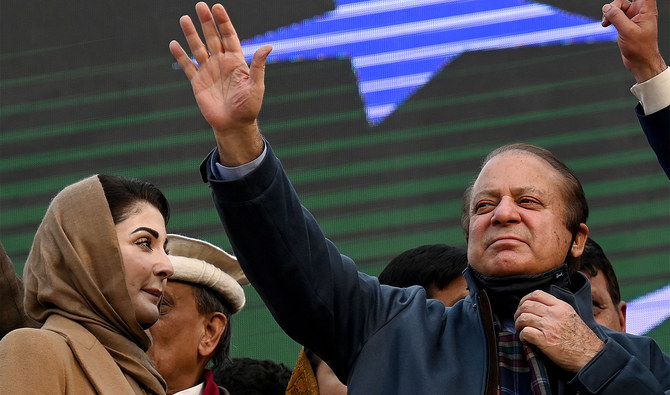ISLAMABAD/NEW DELHI: Nuclear-armed neighbors India and Pakistan agreed to a ceasefire on Saturday after US pressure and diplomacy, announcing a sudden stop to a conflict that had seemed to be spiralling alarmingly.
But within hours, violations were reported from the main cities of Indian-administered Kashmir, the territory that had borne the brunt of four days of fighting.
Blasts were heard in Srinagar and Jammu and projectiles and flashes were seen in the night sky over Jammu, similar to the events of the previous evening, according to authorities, residents and Reuters witnesses.
Pakistani witnesses and local media channels also reported firing from India into Pakistan in Azad Kahmir along the Line of Control, the de facto border that divides the disputed Kashmir region between India and Pakistan.
Military spokespeople in both countries did not immediately respond to requests for comment.
The fighting had been the worst between the old South Asian enemies in nearly three decades and threatened to erupt into a full-scale war in one of the world’s most volatile and densely populated regions.
There were briefly fears that nuclear arsenals might come into play as Pakistan’s military said a top body overseeing its nuclear weapons would meet.
But the defense minister said no such meeting was scheduled, hours after a night of heavy fighting in which the two countries targeted each other’s military bases and the combined civilian death toll rose to 66.
“Pakistan and India have agreed to a ceasefire with immediate effect,” Foreign Minister Ishaq Dar posted on X. “Pakistan has always strived for peace and security in the region, without compromising on its sovereignty and territorial integrity!“
The Indian foreign secretary said the two countries’ military chiefs had spoken to each other and agreed that all fighting would stop at 5 p.m. Indian time (1130 GMT), without using the word “ceasefire.”
US President Donald Trump posted: “After a long night of talks mediated by the United States, I am pleased to announce that India and Pakistan have agreed to a FULL AND IMMEDIATE CEASEFIRE. Congratulations to both Countries on using Common Sense and Great Intelligence.”
HOTLINES AND DIPLOMACY
Dar told the broadcaster Geo News that military channels and hotlines between India and Pakistan had been activated, and three dozen countries had helped to facilitate the agreement.
Foreign Secretary Vikram Misri, India’s top diplomat, said the two military chiefs would speak to each other again on May 12.
On Wednesday, India had attacked what it said was “terrorist infrastructure” in Pakistani Kashmir and Pakistan, two weeks after 26 people were killed in an attack on Hindu tourists in Indian Kashmir.
Pakistan denied India’s accusations that it was involved in the attack. Days of cross-border fire, shelling and drone and missile attacks followed.
Despite the truce, two Indian government sources told Reuters that the punitive measures announced by India and reciprocated by Pakistan, such as trade suspension and visa cancelations, would remain in place for now.
The sources also said the 1960 Indus Waters Treaty, a critical water-sharing pact that India suspended after the Kashmir attack, would remain in abeyance.
The Indian foreign ministry did not respond to a request for comment.
US Secretary of State Marco Rubio said that he and Vice President JD Vance had engaged with Indian Prime Minister Narendra Modi and Pakistan’s Shehbaz Sharif, Indian Foreign Minister Subrahmanyam Jaishankar, Pakistan’s army chief Asim Munir, and the two national security advisers over the course of 48 hours.
TALKS TO FOLLOW AT NEUTRAL VENUE
In a post on X, Rubio commended Modi and Sharif on the agreement, which he said included not only an immediate ceasefire but also the start of talks on “a broad set of issues at a neutral site.”
Jaishankar said India had consistently maintained a firm and “uncompromising stance against terrorism in all its forms and manifestations” and would continue to do so.
News of the ceasefire was greeted with relief on both sides of the border and Pakistan’s airports authority said its airspace had been fully reopened.
Omar Abdullah, chief minister of Indian Kashmir, which bore the brunt of the fighting, welcomed the truce but added: “If it had happened 2-3 days ago, the lives we lost would not have been lost.”
Pakistani news channels showed tanks returning from the border.
“Both Pakistan and India need to lift their large populations on virtually every measure of socio-economic development,” said Ehsan Malik, CEO of the Pakistan Business Council. “We are happy that a ceasefire will help both the governments to focus on this priority.”
Shuja Nawaz, distinguished fellow at the Atlantic Council’s South Asia Center, said the Indus treaty would figure prominently in the impending talks “after a decent interval, which allows both governments to claim credit for what they’ve achieved until now.”
India and Pakistan have been locked in a dispute over Kashmir ever since they were born at the end of British colonial rule in 1947. Hindu-majority India and Muslim Pakistan both rule part of Kashmir but claim it in full.
They have gone to war three times, including twice over Kashmir, alongside numerous smaller outbreaks of fighting.
India blames Pakistan for an insurgency in its part of Kashmir that began in 1989 and has killed tens of thousands. It also blames Pakistani militant groups for attacks elsewhere in India.
Pakistan rejects both charges. It says it only provides moral, political and diplomatic support to Kashmiri separatists.
– With inputs from wires















